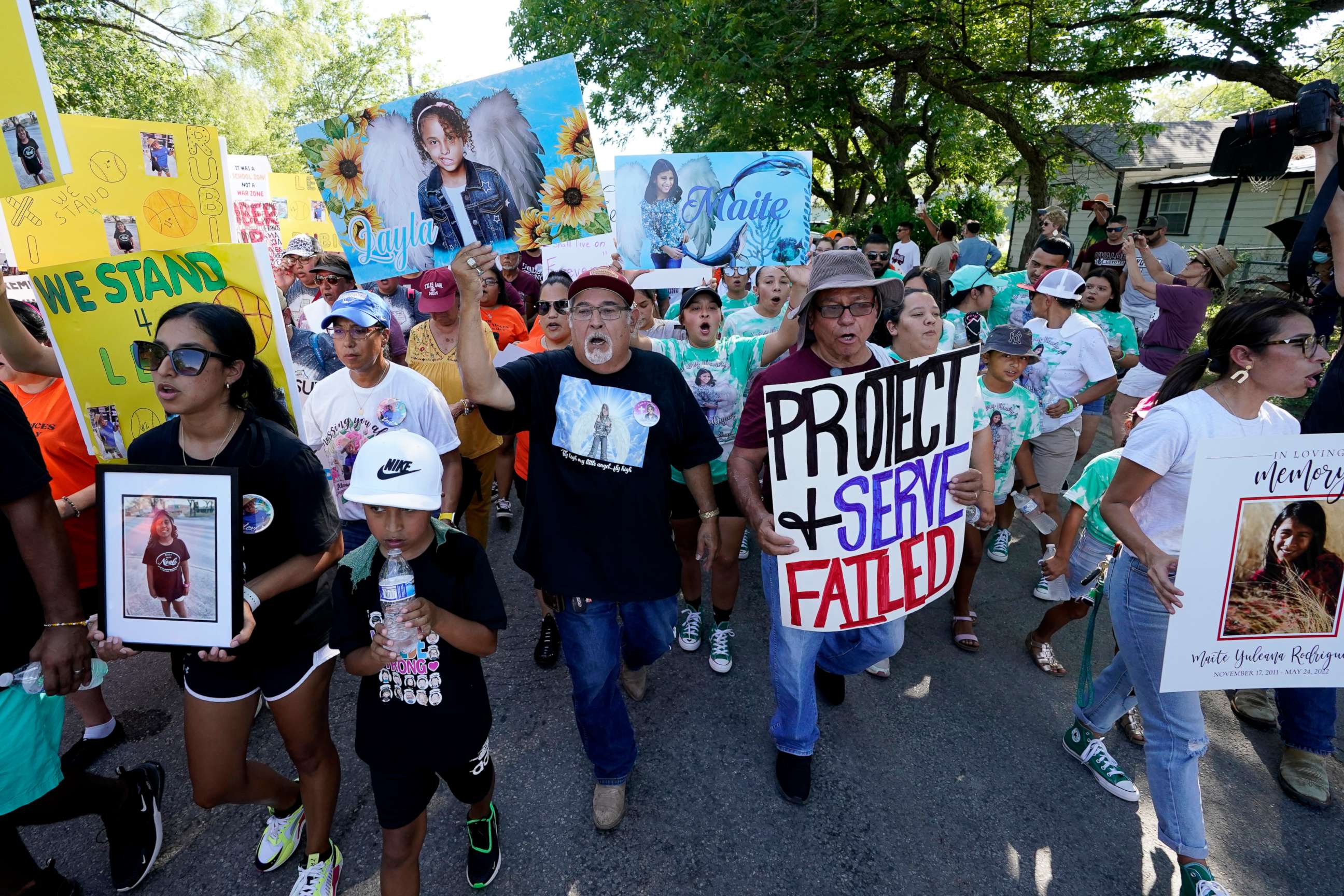Uvalde 1970 school walkout members see parallels to current calls for justice following Robb Elementary shooting
"The people who forget the past will repeat it."
More than 50 years before Robb Elementary School became the site of one of the worst school mass shootings in American history it was the location of one of the biggest demonstrations in the Chicano Rights Movement, a push that sought to reclaim Mexican Americans' Indigenous heritage and original territories.
In the spring of 1970, nearly 650 students staged a walkout over the firing of Josue Garza, one of the few Hispanic, bilingual teachers in the district, amid the larger push for equal rights in the community.

"It was a climax to a chain of injustices for the Mexican American parents and the students," Garza told "Nightline," looking back on the protest 52 years later.
Garza and the students who took part in the walkout said they are seeing history repeat itself as parents, students and residents of Uvalde, Texas, take to the streets in reaction to the fallout from the May shooting that left 19 students and two teachers dead.
They said they are confident the current protests will bring about the same positive change their efforts did back in 1970.
Uvalde:365 is a continuing ABC News series reported from Uvalde and focused on the Texas community and how it forges on in the shadow of tragedy.
Garza was a fifth grade teacher at the school in 1970 and said he wasn't afraid of speaking out for the Latino community over injustices he saw at the school.

Elvia Perez, who was a 17-year-old high school senior at the time, told "Nightline" that she and other Latino students would be mistreated in various ways.
"Kids would get suspended from school, they would get spanked, they would get fined, [and] just different things would happen. That was unfair," she told ABC News. "Why would you want to do that, and not make the kid feel welcome, not make them feel like they're part of that place?"
Garza said his school was not getting the same resources as the predominantly white schools in the neighborhood and worked to improve morale, organizing sports teams and fighting to create basketball courts on the school grounds.
When he was fired, parents and students quickly took their issues to the school board.

Perez said there was inspiration from the Black community activism of the previous two decades.
"I thought, 'You know, it's time we need to start doing some of the same if we want to make a change, if we want to be heard,'" she recalled.
Abelardo Castillo, a Uvalde school walkout organizer, filmed the demonstrations and told "Nightline" that if their demands weren’t met, they wanted to hurt the school board financially.
"If kids don't go to school, the school doesn't get money from the government. Every day a student is absent, that's less money they get," he told "Nightline."

In addition to reinstating Garza to his position, the protesters demanded the board hire more Mexican American teachers and incorporate Mexican American history lessons into the curriculum.
Perez said tensions were high, and she remembered Texas Rangers pointing a gun at her from the roof of the school board building before a meeting.
"It just broke my heart that a citizen should have to endure this, an American, but we weren't seen as Americans," she said.
Garza was never reinstated and the students said they were retaliated against by the school district the following year as many were held back a grade or penalized in other ways.

"I was rumored to be the valedictorian, but I never got to graduate," Perez said.
Still, Uvalde residents didn't stop fighting and later that year a mother of one of the students filed a class action lawsuit contending discrimination.
The case ended in a settlement agreement in 2008, with the parties agreeing to "a specific plan to completely root out the continuing effects of discrimination."
And the lawsuit was only dismissed in 2017 after both parties agreed that the terms of the agreement had been met.

Today, the district has several new schools that offer dual language programs and a more diverse teaching staff.
"It took years for that lawsuit to vindicate what we were alleging back in 1970," walkout participant Alfredo Santos told "Nightline."
And now those same Uvalde residents are seeing history repeat itself.
Parents, teachers and other students have called on the police, elected officials and school board members to be held accountable for the May 24 shooting at Robb Elementary School.
In the aftermath, Uvalde Consolidated Independent School District Police Chief Pete Arredondo resigned from his position on the Uvalde City Council. He was terminated from the police department on Aug. 24 by the school board.
In a 17-page response, Arredondo's attorney stated his client "Did everything he knew how to save the children and school employees on May 24," and that he was "forced into the role of the 'fall guy' and 'the sacrificial lamb.'"

Last week, Uvalde citizens protested outside the Texas Capitol demanding that Gov. Greg Abbott pass stricter gun control laws.
"People found their voice," Perez said. "It was this action that made people realize, 'You know, if we want better for our kids, we gotta start speaking up.'"
Perez said she is confident that the families will be able to make a difference.
Garza, who was eventually elected to the school board and then mayor in 1996, agreed and encouraged the community to continue to raise its voice.
"The people who forget the past will repeat it," he said. "I hope we can come up stronger than ever, for the sake of our children, our students."




